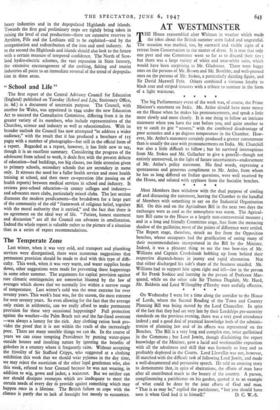AT WESTMINSTER
THE House reassembled after Whitsun in weather which made the jokes about the British summer seem faded and ungrateful. The occasion was marked, too, by outward and visible signs of a retreat from Conservatism in the matter of dress. It is true that only one peer and one Commoner went so far as to discard their ties ; but there was a large variety of white and near-white suits, which would have been surprising to Mr. Gladstone. There were baggy ones on the persons of Mr. Brown and Mr. Boothby, and well-pressed ones on the persons of Mr. Stokes, a particularly dazzling figure, and Sir David Maxwell Fyfe. Others combined a virtuous loyalty to black coat and striped trousers with a tribute to summer in the form of a light waistcoat.
The big Parliamentary event of the week was, of course, the Prime Minister's statement on India. Mr. Attlee should have more mercy on the House when he makes his pronouncements, and speak a little more slowly and more clearly. It is one thing to follow an intricate statement when you have the text before you, and quite another to try to catch its gist "unseen," with the combined disadvantage of poor acoustics and a 90 degrees temperature in the Chamber. How- ever, Mr. Attlee's statement certainly produced a greater contentment than is usually the case with pronouncements on India. Mr. Churchill was also a little difficult to follow ; but he survived interruptions from Mr. Stokes and Mr. Gallacher to give a gener.al—though not entirely unreserved, in the light of future uncertainties—endorsement of Mr. Attlee's policy statement. His final words, expressing a spontaneous and generous compliment to Mr. Attlee, from whom he has so long differed on Indian questions, were well received by the House, and saluted with applause from the Socialist benches.
Most Members then withdrew with the dual purpose of cooling off and discussing the statement, leaving the Chamber to the handful of Members with something to say on the Industrial Organisation Bill. On this and on the Agriculture Bill in the next two days the exchanges were as cool as the atmosphere was warm. The Agricul- ture Bill came to the House as a largely non-controversial measure ; and in a long and friendly Committee stage, free from the menacing shadow of the guillotine,snost of the points of difference were settled. The Report stage, therefore, struck no fire from the Opposition benches, whose occupants had the gratification of seeing many of their recommendations incorporated in the Bill by the Minister. Indeed, it was a pleasant thing to see the two bow-ties of Mr. Williams and Captain Crookshank bobbing up from behind their respective dispatch-boxes in jaunty and rapid alternation. Not that either discharged his side's share of the business unaided. Mr. Williams had to support him upon right and left—law in the person of Sir Frank Soskice and learning in the person of professor Mar- quand, while on the other side Sir Thomas Dugdale, Mr. Hurd, Mr. Baldwin and Lord Willoughby d'Eresby were usefully effective.
On Wednesday I went for a time along the corridor to the House of Lords, where the Second Reading of the Town and Country Planning Bill was being moved by the Lord Chancellor. In spite of the fact that they had sat very late by their Lordships pre-austerity standards on the previous evening, there was a very good attendance indeed ; and a good deal of practical knowledge both of the adminis- tration of planning law and of its effects was represented on the Benches. The Bill is a very long and complex one, twice guillotined in the Commons ; but Lord Jowitt, though disclaiming the expert knowledge of the Minister, gave a lucid and workmanlike exposition with all the adroitness and skill that was formerly so long and so profitably deployed in the Courts. Lord Llewellin was not, however, ill matched with the difficult task of following Lord Jowitt, and made a well-documented and persuasive speech. He told an amusing story to demonstrate that, in spite of aberrations, the efforts of man have after all contributed much to the beauty of the country. A parson, complimenting a parishioner on his garden, quoted it as an example of what could be done by the joint efforts of God and man. "That is as may be," replied the parishioner, "but you should have seen it when God had it to himself." D. C. W.-S.


































 Previous page
Previous page